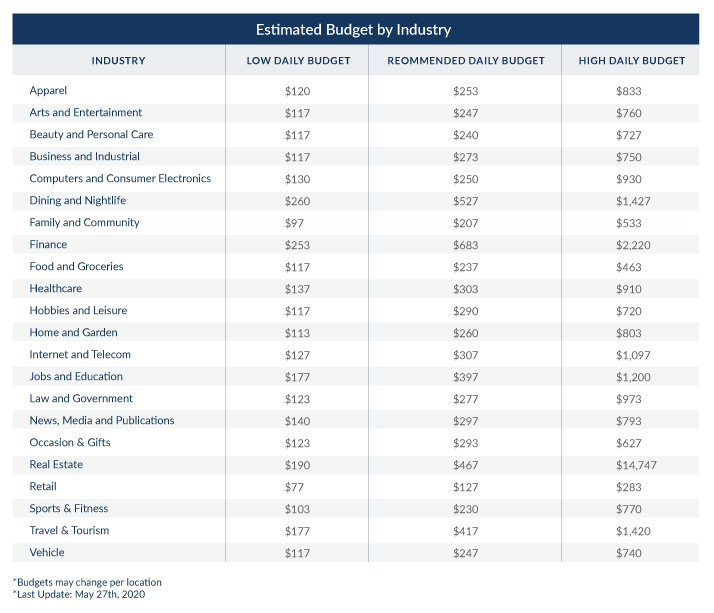The costs of Google Ads, formerly Google Adwords, can be easily misconstrued with fixed fees from traditional advertising like radio or highway banners. Unlike these fixed-cost channels, Google Ads operates as an auction marketplace for website visitors. Therefore, your Google Ads Budget is primarily shaped by your industry rather than the advertising platform.
The Answer is : It Depends
While it might seem that advertising funds are straightforwardly assigned to Google Ads, in reality, they are targeted at specific markets within the platform. Each keyword group carries its own pricing and considerations. Moreover, when you bid for clicks on Google, you’re not vying for global clicks; rather, you compete for those relevant to your business and competitors. In the realm of Google Ads, where keywords are auctioned, determining an appropriate budget hinges on the costs associated with the keywords you plan to bid on. Intense competition for a specific keyword can elevate its cost, affecting your budget, with significant fluctuations based on the industry.
Minimum Amount you Should spend on Google Ads
There’s no strict minimum for Google Ads budget, but expecting substantial results from a mere $2 or $5 daily budget is impractical. A common notion is, “I’ll start small, and if it works, I’ll increase the budget.” However, Google Ads doesn’t align with this approach.Consider it akin to placing a tiny classified ad in a newspaper with the expectation that, if it yields results, you’ll invest in a full-page ad. This logic, transferring success from a small, low-cost ad to a larger, more expensive one, is fundamentally flawed, especially in an auction-based pricing model where higher costs signify higher value.As a guideline, when gathering data, aim for a minimum of six clicks per day. For instance, if you’re in the car insurance industry with an average CPC of $25, attaining six quality clicks would require a daily budget of $150. This underscores the importance of aligning your budget with the competitive landscape and industry standards.
Recommended Monthly Budget You Should Allocate to Google Ads
To kick off advertising on Google, our experts suggest starting with a monthly Google Ads budget between $500 and $5,000. This depends on your business, goals, and where you want to target your ads.If you’re just starting and not super experienced with Google Ads, it’s good to begin with a smaller budget that still lets you compete. But if you know your way around, you might consider a bigger budget. Spending more money means getting more clicks, which gives you lots of useful information. And having data is like having a super helpful tool for making your ads work better.

Investment Strategy Consideration: One Big Sum or Spread Over Time?
Many make the mistake of sticking to a small monthly Google Ads Budget without considering increasing it. Over a year, this might add up to $12,000 with little to show for it.
- Smart Allocation Scenario: A Quarter with a Significant Investment
- Investing $4,000 per month over a quarter, totaling $12,000.
- Benefits:
- Shorter evaluation time to determine the effectiveness of the advertising channel.
- The ability to compete on a level playing field with other advertisers.
- Benefits:
- Investing $4,000 per month over a quarter, totaling $12,000.
- Industries with Potential High CPC
- Some industries have keywords with a notably high cost per click (CPC), sometimes reaching $30-50 PER CLICK.
- Notable examples include
- Financial Services
- Pest Control
- HVAC
- Plumbing
- Notable examples include
- Some industries have keywords with a notably high cost per click (CPC), sometimes reaching $30-50 PER CLICK.

Investing strategically in a shorter time frame can be more impactful in such industries.
Average Keyword Costs
Typically, keywords in industries like Financial Services, Pest Control, HVAC, and Plumbing fall within the $10 to $30 range. Consequently, running campaigns with a budget as low as $1,000 per month may not yield noticeable results. This could lead to the misconception that Google Ads is an ineffective marketing channel.
The Importance of Proper Information
However, the reality may be different. In many cases, lack of success can be attributed to inadequate information for setting up campaigns correctly. It’s crucial to have the right knowledge to make Google Ads work effectively for your business.
Determining Your Cost Per Click (CPC):
- Consider Your Funnel Position:
- Upper-funnel keywords may give a misleading impression of CPC costs and budgets.
- These words are cheaper but lack clear buying intent.
- Understanding Keyword Dynamics:
- The right keywords, especially those signaling purchase intent, tend to be more expensive.
- For example, if you’re a cleaning company, generic terms like “cleaning” may not be effective.
- Opt for Specific Keywords:
- Target more specific and purchase-oriented keywords:
- Cleaning company in Denver Colorado
- Housekeeping services in Denver
- Maid pricing Denver
- Factors Driving Keyword Costs:
- Such specific keywords are pricier due to:
- High demand
- Increased competition
- Higher return on investment (ROI) potential
- Importance of Precision:
- A potential customer searching for “cleaning company in Denver Colorado” signals a stronger intent to hire a cleaning service compared to generic terms like “cleaning” or “maid.”
Understanding Cost Differences Based on Search Intent
- Influence of Buying Funnel:
- Your position in the buying process affects the cost of clicks in the same industry.
- Example with a Cleaning Company:
- Informational Keywords:
- Cleaning jobs = $1.05 per click.
- Salaries as a cleaning lady = $2.18 per click.
- Cleaning supplies company = $2.81 per click.
- Intent-Driven Keywords:
- Cleaning company = $12.23 per click.
- Cleaning company in Denver = $9.53 per click.
- Local cleaning company = $6.43 per click.
- Informational Keywords:
- Why Keyword Selection Matters
-
- The type of keywords you choose significantly impacts the cost.
- It’s crucial to focus on the right keywords to determine your budget and cost per click effectively.
-
- Important Note: If you’re a cleaning company and the listed costs seem different, factors like your Quality Score, target location, and ad position can cause these variations.
Viewing Costs as an Investment, Not an Expense
- Concerns About Google Ads Fees:
- New advertisers often worry about Google Ads fees impacting their profits.
- Shifting the Mindset:
- Advertising isn’t just an expense; it’s an investment that generates income.
- Key Transformation: Tracking Your Investment
- Why Tracking Matters:
- Understand what you gain from your investment.
- Examples of Tracking in Campaigns:
- Conversion Tracking:
- Measures desired actions like form submissions or sign-ups.
- Ecommerce Tracking:
- Monitors online sales generated through your ads.
- Transaction Tracking:
- Tracks specific transactions tied to your campaigns.
- Lead Form Tracking:
- Evaluates the success of lead generation forms.
- Call Tracking
- Analyzes the effectiveness of calls generated by your ads.
- Conversion Tracking:
- Why Tracking Matters:
- Benefits of Tracking:
- Enables you to see Google Ads as a strategic investment with measurable returns, not just an added cost.
Is Investing in Google Ads a Wise Decision?
Deciding whether Google Ads is a good investment is a thoughtful process. If you have a reputable business, diving into PPC advertising with Google Ads is a smart move. It’s crucial to weigh aspects like your website’s quality, the nature of your industry, and the competition you face.Successful businesses tend to benefit more from Google Ads, seeing a noticeable increase in customer acquisition. However, if your business is struggling and lacks word-of-mouth success, Google Ads might not be the magic solution.For businesses doing well with a recognized market position, investing in Google Ads can be a highly beneficial strategic move. It’s important to view Google Ads as a supportive investment that complements your business strength rather than a standalone solution. Consider your unique situation and industry data to make an informed decision.
Key Takeaways : As we wrap up, here are key considerations to bear in mind
- Industry-Specific budget:
- Google Ads budget is industry-dependent; the optimal amount varies based on your specific business sector.
- Industry Cost Disparities:
- Be mindful of substantial cost differences across various industries when planning your google ads budget.
- Keyword Precision Matters:
- Accurately estimate costs by selecting relevant and effective keywords for your campaigns.
- Budget Alignment:
- Ensure your expenditure aligns with your budget constraints and reflects a strategic approach tailored to your business needs.
- Platform Value:
- Recognize that Google Ads can deliver substantial value for businesses prepared to manage increased attention, traffic, and demand. Strategically approach your Google ADS for optimal results.
Enjoyed what you’ve just read? Ready to elevate your business with the power of Google Ads? Feel free to book a free marketing consultation to discuss about your Google Ads Budget. Our experts are eager to dive into your unique needs and discuss how we can propel your business to new heights. Connect with us, and let’s chart a course for your success!

